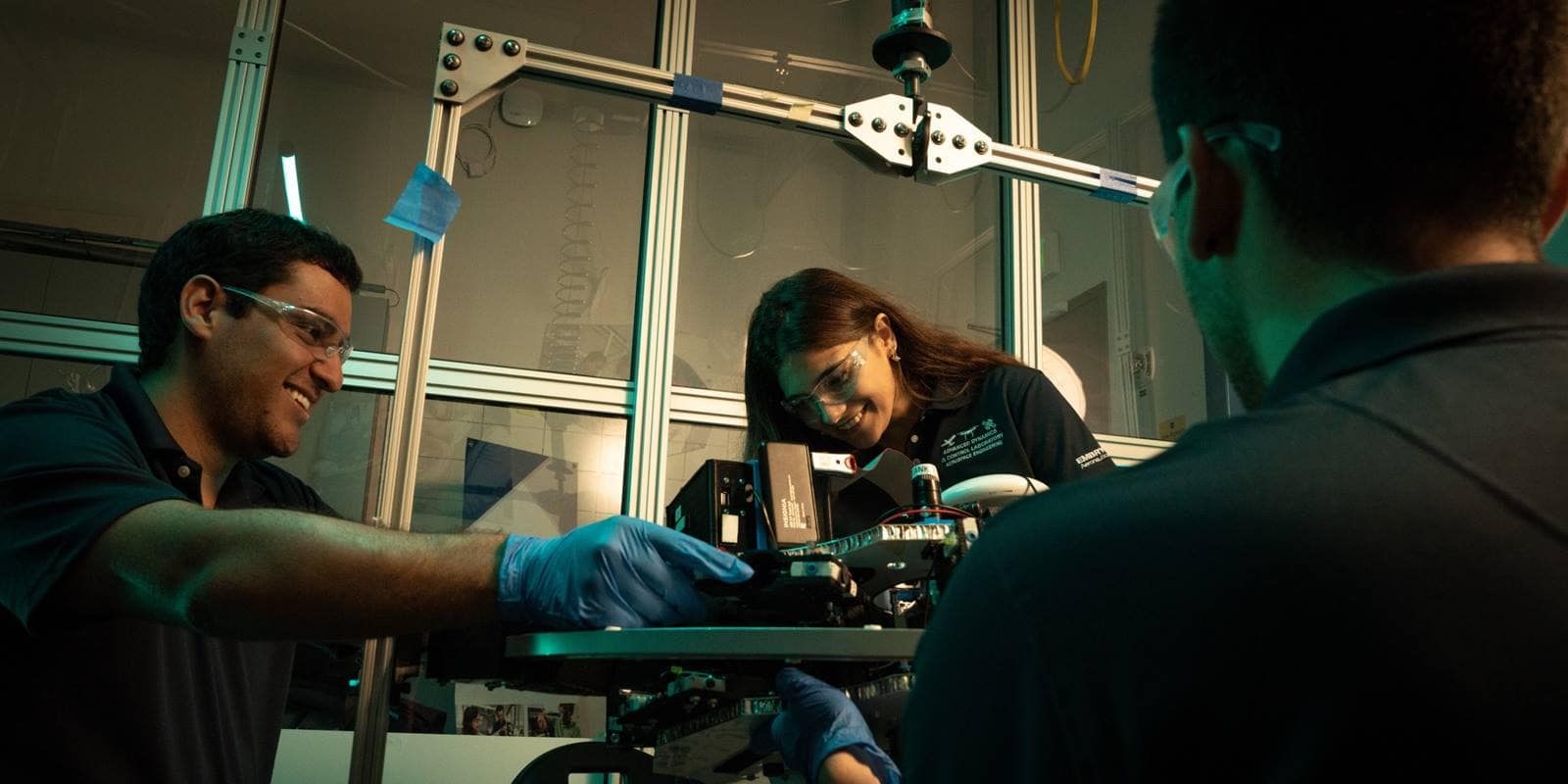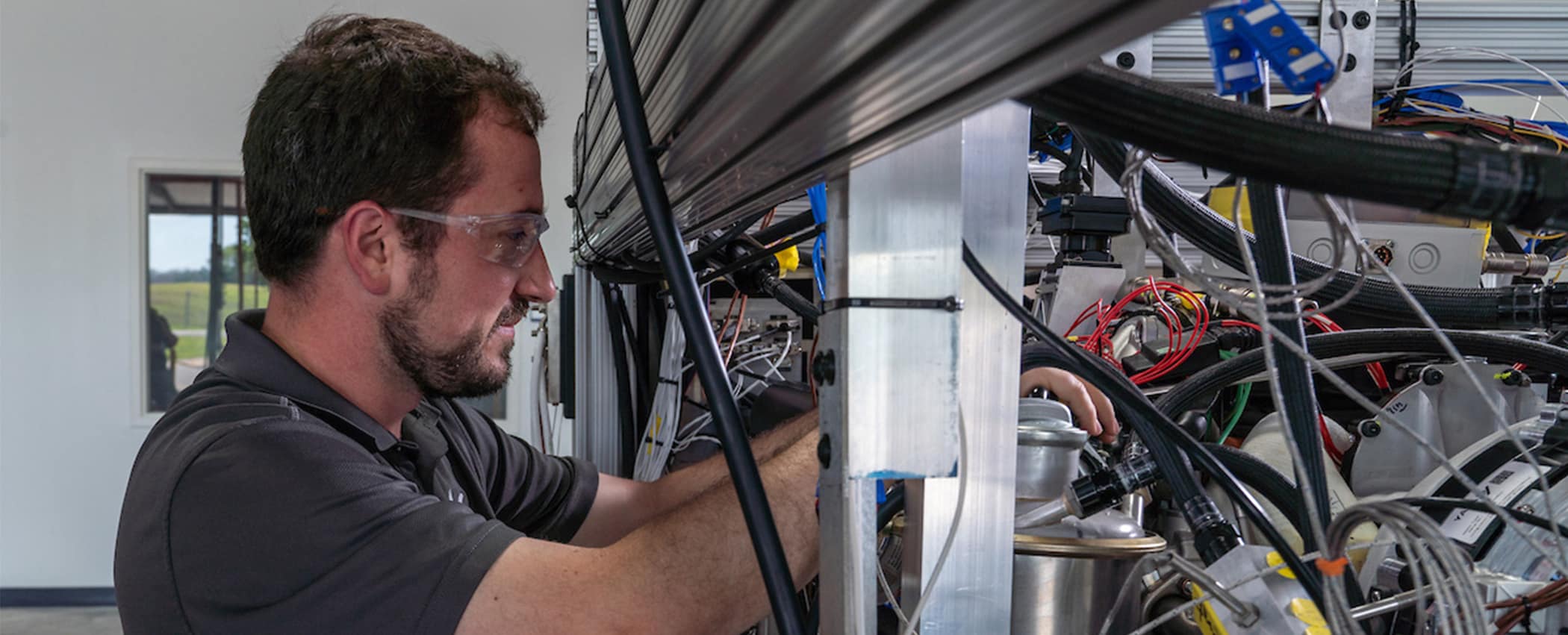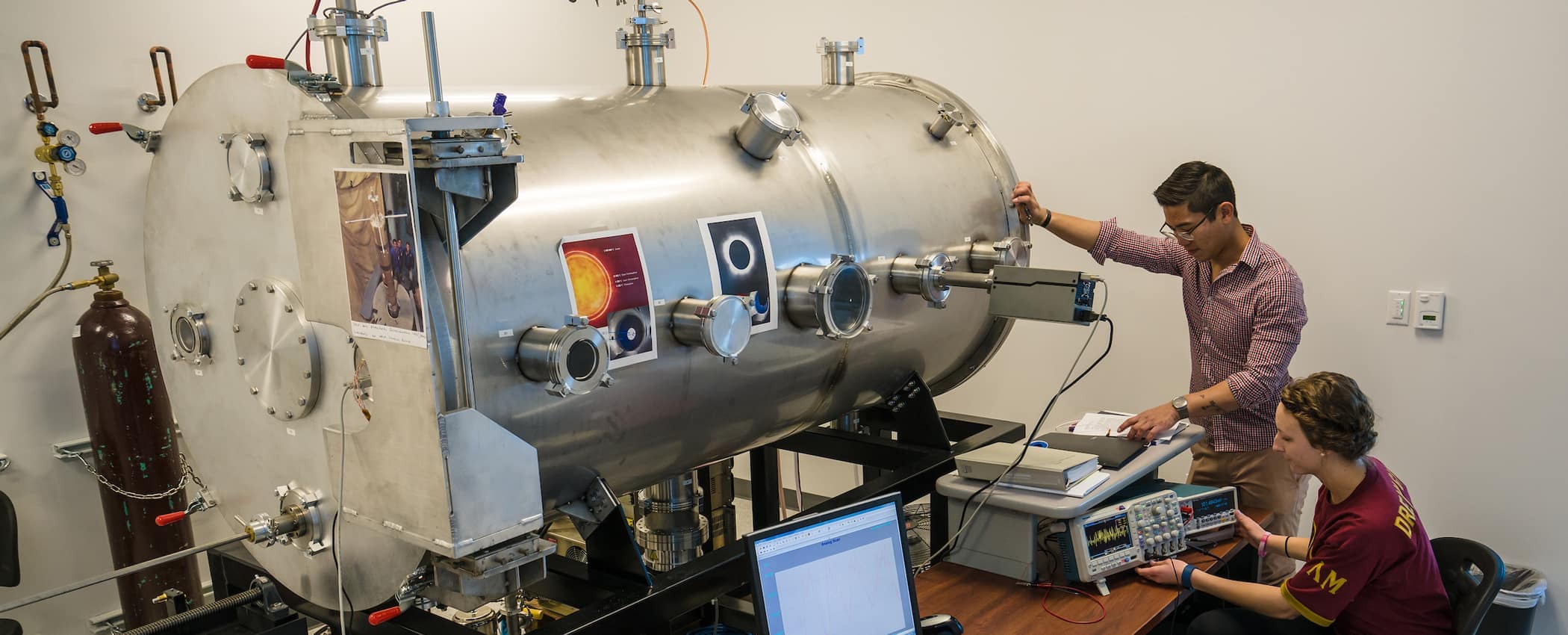
Master of Science in
Aerospace Engineering
The Master of Science in Aerospace Engineering program uses theoretical and practical training to help graduates learn spacecraft and aircraft design.
About the Master of Science in Aerospace Engineering
As a recognized leader in aviation and aerospace education, Embry‑Riddle offers a Master of Science in Aerospace Engineering program that prepares graduates for a successful career in satellite and aircraft design, space exploration and more.
This graduate degree is designed for students who already have a degree in Aerospace Engineering or a related engineering field. The curriculum provides a favorable balance of practical and theoretical training. Students augment their engineering and science background with studies in computational fluid dynamics, aeroacoustics modeling, rotorcraft aerodynamics, flow control, air-breathing hypersonic and rocket propulsion and autonomous uncrewed aircraft, as well as other topics in aerospace engineering.
Student Learning Outcomes
Opportunities available to you while receiving a M.S. in Aerospace Engineering:
- Flexibility and rigor to accommodate both full-time students and working professionals' needs
- Specialty course and research opportunities for graduate students to shape their degree
- Gain first-hand knowledge, enthusiasm and guidance from industry-leading faculty
- Research areas including computational fluid dynamics, aeroacoustic modeling, guidance, navigation and control, computational structural mechanics and design optimization
- Assist in paving the way in aerospace research and development
Aerospace Engineering Career Opportunities
Careers and Employers
Master’s students graduating from Embry-Riddle’s Aerospace Engineering degree program enjoy an extremely high 93% placement rate within one year of graduation. Many graduates transition into careers with companies such as SpaceX, NASA, the U.S. Department of Defense, Delta Air Lines and Gulfstream Aerospace.
Aerospace Engineering graduates tend to enter into the aerospace industry in positions such as avionics engineering, aeronautical engineering, aerospace system analysis and performance engineering.
Aerospace Engineering Salary Information
As of 2023, students graduating with a Master of Science in Aerospace Engineering tend to receive competitive salaries, with an average income of $95,000 annually.
DETAILS
About Aerospace Engineering at the Worldwide & Online Campus
Embry‑Riddle’s online aerospace engineering degree has been one of the field’s most sought-after degrees, preparing you to participate in and lead cutting-edge research, innovation and development.
With this flexible online platform, you can enhance your scientific background in the areas of aerodynamics and propulsion, dynamics and control, aeronautical engineering and structures and materials.
Worldwide classes can be taken at your convenience within the semester, designed around your work and life schedules.
Engineering Information
- Credits: 30
- Mode of Study: Fully Online
Helpful Links
- Attend a Worldwide Virtual Info Session
- Discover the Department's Faculty
- Explore the Fields of Study: Aviation & Space & Engineering
- Find Related Clubs & Organizations
Student Learning Outcomes
Students will:
- Use analytical methods to analyze and solve engineering problems.
- Conduct research and/or independent study.
- Use written and oral communication effectively.
- Use numerical methods to analyze and solve engineering problems.
DEGREE REQUIREMENTS
Core/Major
| AENG 502 | Strength and Fatigue of Materials | 3 |
| AENG 510 | Aircraft Structural Dynamics | 3 |
| AENG 511 | Engineering Materials Selection | 3 |
| AENG 514 | Introduction to the Finite Element Method | 3 |
| AENG 522 | Analysis of Aircraft Composite Materials | 3 |
| AENG 540 | Structural Health Monitoring | 3 |
| AENG 612 | Analysis of Aircraft Plate and Shell Structures | 3 |
| AENG 525 | Structural Design Optimization | 3 |
| MATH 502 | Boundary Value Problems | 3 |
| Take one of the following elective courses: | 3 | |
SYSE 500 | Fundamentals of Systems Engineering | |
SYSE 530 | System Requirements Analysis and Modeling | |
SYSE 560 | Introduction to Systems Engineering Management | |
SYSE 610 | System Architecture Design and Modeling | |
SYSE 625 | System Quality Assurance | |
AWEN 502 | Airworthiness Process and Procedures | |
AWEN 510 | Aircraft Airworthiness Engineering Principles | |
| Total Degree Requirements | 30 | |
Plan of Study (MSAE)
Year One
| Term 1 | Credits | |
|---|---|---|
| MATH 502 | Boundary Value Problems | 3 |
| Credits Subtotal | 3.0 | |
| Term 2 | ||
| AENG 502 | Strength and Fatigue of Materials | 3 |
| Credits Subtotal | 3.0 | |
| Term 3 | ||
| AENG 510 | Aircraft Structural Dynamics | 3 |
| Credits Subtotal | 3.0 | |
| Term 4 | ||
| AENG 514 | Introduction to the Finite Element Method | 3 |
| Credits Subtotal | 3.0 | |
| Term 5 | ||
| AENG 511 | Engineering Materials Selection | 3 |
| Credits Subtotal | 3.0 | |
| Credits Total: | 15.0 | |
Year Two
| Term 1 | Credits | |
|---|---|---|
| AENG 522 | Analysis of Aircraft Composite Materials | 3 |
| Credits Subtotal | 3.0 | |
| Term 2 | ||
| AENG 525 | Structural Design Optimization | 3 |
| Credits Subtotal | 3.0 | |
| Term 3 | ||
| AENG 540 | Structural Health Monitoring | 3 |
| Credits Subtotal | 3.0 | |
| Term 4 | ||
| AENG 612 | Analysis of Aircraft Plate and Shell Structures | 3 |
| Credits Subtotal | 3.0 | |
| Term 5 | ||
| Elective | 3 | |
| Credits Subtotal | 3.0 | |
| Credits Total: | 15.0 | |
| Total Degree Requirements | 30 | |
Get Started Now:
Summary
30 Credits
Estimate your tuition by using the Tuition Calculator
View Financial Aid Information
Learn more about the benefits of an Online Degree
Learn about our General Education
Find out about transferring credits to this degree
Learn more about our Veterans & Military benefits
View our Academic Calendar
Search Courses for this degree



